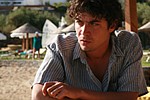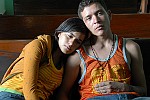 Shadows off the beaten path
Shadows off the beaten pathTHE FISH CHILD [El Niño Pez] | WITHOUT A NAME [Sin Nombre]
< < F O R E I G N > >
last update 30.May.09
See also: SHADOWS FILM FESTIVAL
 R E V I E W B Y R I C H C L I N E
R E V I E W B Y R I C H C L I N E Pour Elle
Pour Elle
with Vincent Lindon, Diane Kruger, Lancelot Roch, Olivier Marchal, Hammou Graïa, Liliane Rovère, Olivier Perrier, Moussa Maaskri, Rémi Martin, Thierry Godard, Slimane Hadjar, Dorothée Tavernier
 release Fr 3.Dec.08,
release Fr 3.Dec.08, UK 5.Jun.09
08/France Fidelite 1h36
THE NEXT THREE DAYS (2010)
 A huge emotional hook helps this thriller seriously crank up the tension. The plot may seem a bit contrived, but it's such an all-consuming movie experience that it's well worth a look.
A huge emotional hook helps this thriller seriously crank up the tension. The plot may seem a bit contrived, but it's such an all-consuming movie experience that it's well worth a look.
Julien (Lindon) is at the end of his tether after his beloved wife Lisa (Kruger) is convicted of a murder she didn't commit and locked up for 20 years. While teaching school and raising their son (Roch) on his own, he spends three years trying to figure out a way to get her out. So when the final legal appeal is rejected, he turns to a much more outrageous idea: breaking her out of prison. But can a schoolteacher carry out the perfect crime?
The way the film addresses that question is the weakest link, as the plot features several corny action cliches along the way to a souped-up ending. But writer-director Cavaye isn't actually concerned with these genre elements; he's making a film about the lengths people will go to rescue and protect the ones they love. And this more emotional side of the story actually makes the suspense extremely forceful, simply because we have such a strong connection with the characters.
Instead of heavy plotting, Cavaye builds a strong sense of injustice and helplessness. The camerawork is sharp and extremely clever, using telling details, surreal touches and suggestive editing to take us beneath the surfaces. Both Lindon and Kruger beautifully bring out their characters' inner lives as well; these are openly emotional performances that are tinged with steeliness and hope. And both characters include some striking irony as they turn into people quite different than we (or they) expect.
By withholding key plot details while filling in these character shadings, Cavaye creates a thriller that's often unnervingly intense. There are scenes that play with our affections along the way, such as when Julien finds himself attracted to another woman. And the risks they both take are mind-bogglingly all-consuming, and sometimes almost unbearable to watch. We genuinely fear for the lives of these people, and Cavaye doesn't release its grip on us until the very last moment. Which makes it a thoroughly remarkable film despite its lapses.
7.Apr.09
 R E V I E W B Y R I C H C L I N E
R E V I E W B Y R I C H C L I N E Eden à l’Ouest
Eden à l’Ouest
scr Costa-Gavras, Jean-Claude Grumberg
with Riccardo Scamarcio, Ulrich Tukur, Juliane Koehler, Eric Caravaca, Odysseas Papaspiliopoulos, Florian Martens, Antoine Monot, David Lowe, Jean-Christophe Folly, Jian-Zhang, Igor Raspopov, Ana Paula Aurijo
 release Fr 11.Feb.09,
release Fr 11.Feb.09, US Mar.09 rwfc
09/France Pathe 1h51
Closing film:

 This bright and engaging fable loosely adaptats Homer's Odyssey to modern-day Europe, touching on big issues like immigration and multiculturalism while telling the story of a likeable young man on the journey of his life.
This bright and engaging fable loosely adaptats Homer's Odyssey to modern-day Europe, touching on big issues like immigration and multiculturalism while telling the story of a likeable young man on the journey of his life.
When officials board a boat full of illegal immigrants, Elias (Scamarcio) dives overboard and swims to shore. He's a bit taken aback to find himself in a nude resort called Eden, but strips off and, as if newly born, easily blends into the crowd. Borrowing a staff uniform, he escapes the police search, meets a travelling magician (Tukur) and is taken in by a lonely woman (Koehler). But the cops are on his trail, and he hits the road for a series of adventures on his way to Paris.
There's wonderful sense of timelessness to this. Besides the sequences in Paris, we never really know where we are, and the people speak a bewildering array of languages. Within this, Scamarcio plays Elias as a Chaplinesque everyman, using very little dialog to convey thoughts and feelings and perpetually reinventing himself as he finds new clothes. It's an utterly winning performance that puts us completely on his side, even though he's technically subverting the law and we have no idea where he's from or why he's headed to Europe.
Elias is so charming that we can easily understand why everyone he meets is taken with him and both men and women throw themselves at him. And the variety of people he encounters along the way is clever and vibrant, from a motorcycle gang to gay truckers to a bickering rich couple. All are played with a slightly heightened realism that's thoroughly effective. Scenes are loaded with irony, such as when Elias is enlisted to search for the escaped migrants.
As each anecdotal escapade or misunderstanding pushes him continually forward, Elias tellingly encounters other immigrants and sidelined minority groups, such as gypsies. Filmmaker Costa-Gavras keeps the tone lively and comical all the way through, with sunny cinematography that creates a telling contrast against these darker themes. And even though this is Elias' tale, we are vividly reminded that everyone he meets has a story all their own.
14.Feb.09 bff
 R E V I E W B Y R I C H C L I N E
R E V I E W B Y R I C H C L I N E El Niño Pez
El Niño Pez
with Inés Efron, Mariela Vitale, Pep Munné, Julián Doregger, Arnaldo André, Diego Velázquez, Emme, Carlos Bardem, Sandra Guida

release Arg 9.Apr.09,
US Apr.09 tff,
UK Jun.09 eiff
09/Argentina MK2 1h36


 Filmmaker Puenzo reunites with her XXY star Efron for this intriguingly warm and textured thriller. The plot kind of goes off the rails, but the internal drama is beautifully written and played.
Filmmaker Puenzo reunites with her XXY star Efron for this intriguingly warm and textured thriller. The plot kind of goes off the rails, but the internal drama is beautifully written and played.
In Buenos Aires, rich teen Lala (Efron) has fallen in love with her low-caste maid Ailin (Vitale). Lala's brother (Doregger) is just home from rehab, and her judge father (Munne) is getting death threats, so they're oblivious to Lala's dream to run off to Ailin's abandoned family home in Paraguay and live happily ever after. But their crazy plan goes awry, leaving Lala in Paraguay, where she meets Ailin's former soap-star dad (Andre), and Ailin in Argentina, where she's cornered by the cops for something Lala did.
The film's real story is of two young women finding their independence in a male-dominated society. This develops in a complex and fascinating way, with all kinds of harsh revelations and surprising moments that draw on the considerable skills of the young cast. Puenzo has a firm grip on this aspect of the film; the interaction between Efron and Vitale is extremely powerful, and this extends to their scenes with the men around them.
Oddly, two things that distract us along the way. The first is the Paraguayan fable of the title, about a little lake-dwelling boy who cares for the spirits of drowned children. And the second is a colourful crime boss (Velasquez) who threatens to turn the film into a Latina Thelma & Louise with gun-blazing girls on the run. Both of these elements are essentially red herrings, and they kind of weaken the punch of the much stronger core narrative.
Fortunately, that central focus is so emotive that it keeps us gripped. And it also helps that Puenzo films it like a dreamlike fairy tale, with magical imagery that really sparks the imagination and bridges the out-of-sequence storytelling. Even as the luxuriant imagery and pace give way to a more grim action thriller, the film is thoroughly involving. And it so astutely and artfully grapples with issues of both class and gender that it can't be ignored.
12.Feb.09 bff
 R E V I E W B Y R I C H C L I N E
R E V I E W B Y R I C H C L I N E Sin Nombre
Sin Nombre
with Edgar Flores, Paulina Gaitan, Kristian Ferrer, Tenoch Huerta, Luis Fernando Peña, Gerardo Taracena, Guillermo Villegas, Diana Garcia, Catalina López, Hector Lortia, Emir Meza, David Serrano
 release US 20.Mar.09,
release US 20.Mar.09, Mex 15.May.09,
UK 14.Aug.09
09/Mexico 1h36
SUNDANCE FILM FEST

 Gorgeously shot and edited, and performed with a gentle emotional openness, this gritty odyssey tells a deeply personal story while examining much bigger issues in Central America and beyond.
Gorgeously shot and edited, and performed with a gentle emotional openness, this gritty odyssey tells a deeply personal story while examining much bigger issues in Central America and beyond.
In southern Mexico, Willy (Flores), whose gang nickname is El Caspar, helps 12-year-old Benito (Ferrer) join the Mara Salvatrucha brotherhood, with initiations including 13 seconds of vicious beating and the murder of a rival chavala. But Willy finds himself at odds with the gang leader (Huerta) because of Willy's secret girlfriend (Garcia). Meanwhile in Honduras, Sayra (Gaitan) reluctantly decides to take a perilous journey north with her father and uncle (Taracena and Villegas) to join her father's new family in America. When Willy and Sayra's paths cross, their lives change directions drastically.
Filmmaker Fukunaga tells this urgent, powerful story at a relaxed, lyrical pace, making the most of the colourful, cluttered settings with Adriano Goldman's lush cinematography. The film's easy rhythm is echoed in the click-clack of the moving trains that are in most scenes; indeed, much of the story takes place in purgatory-like train yards, where characters wait for something to happen, or on the tops of trains slowly inching north to the land of promise.
But this casual approach to the story is constantly undercut by the subject matter, which is edgy and often terrifying. In this tough, elemental place, life is startlingly fragile, which the script acknowledges through sudden, almost off-handed tragedy and the constant threat of both brutal gang violence and police capture. But even in this darkness, the film has an underlying salsa beat, a whiff of hopefulness that lets its characters find joy and belonging even in the most horrific situations.
This delicate balancing act gives the film a very strong kick that's only slightly weakened by some slightly overwrought final-act plotting. We are drawn into the warmth of the characters' tentative tenderness and sometimes misplaced loyalties. At the same time, the film is making a powerful comment on issues of identity and nationality, as well as the grotesque injustices that have created these climates of violence and desperation. And Fukunaga doesn't even have to explicitly note how the West continues to blame the symptoms, rather than addressing the actual problems.
29.May.09


See also: SHADOWS FILM FESTIVAL
© 2009 by Rich Cline, Shadows
on the Wall